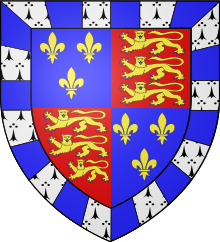Thomas Beaufort, Duke of Exeter
Thomas Beaufort | |
|---|---|
 Coat of arms of Thomas Beaufort, Duke of Exeter | |
| Born | c 1377 |
| Died | December 31, 1426 |
| Occupation(s) | Lord Chancellor Lord High Admiral Earl of Dorset Duke of Exeter |
| Spouse | Margaret Neville |
| Children | Henry |
| Parent | John of Gaunt, 1st Duke of Lancaster & Katherine Swynford |
Thomas Beaufort, Duke of Exeter (c. 1377 – c. 31 December 1426) was an English military commander during the Hundred Years' War, and briefly Chancellor of England.
He was the third of the four children of John of Gaunt, Duke of Lancaster, and his mistress Katherine Swynford. He was legitimated when the others were, in 1390 and again in 1397.
After the accession of his half-brother Henry IV, Beaufort was made a Knight of the Garter. In the following years he held various military posts: constable of Ludlow (1402), admiral of the fleet for the northern parts (1403), captain of Calais (1407), and admiral of the northern and western seas for life (1408/9). His most notable action during this decade was commanding the forces against the northern rebellion of 1405.
He was Chancellor of England from January 31, 1410 to January 5, 1412[1] during a time when King Henry was having trouble with the clergy, and then returned to military matters. Later in 1412 he was created Earl of Dorset.
On the accession of Henry V Beaufort was appointed Lieutenant of Aquitaine (1413) and then captain of Harfleur (1415). He spent the next years in Normandy, being Lieutenant of Normandy (1416). He was created Duke of Exeter for life, in 1416.
Beaufort was back in England in 1417, while the king was in Normandy, but had to deal with problems in Scotland. In 1418 he went back to Normandy with a large force, taking part in the sieges of Evreux, Ivry, and Rouen. After the fall of Rouen in 1419, he was captain of the city, and conquered more of the smaller Norman cities. Finally in 1419 he took the great fortress of Chateau-Gaillard, midway between Rouen and Paris, after a six month siege.
During this time Henry V had a policy of creating Norman titles for his aristocrats, and thus Beaufort was created Count of Harcourt in 1418.
In 1420 Beaufort helped negotiate the treaty of Troyes. The next year he was captured at the Battle of Baugé where his nephew Thomas of Lancaster, 1st Duke of Clarence was killed.
Beaufort was one the executors of Henry V's will, and so returned to England in 1422. He served on the governing council for the infant king Henry VI, though it's likely he spent some time in France as well.
He married a Margaret Neville (there were a lot of Margarets and a lot of Nevilles around the royal circle then, but this one was the daughter of Sir Thomas Neville of Horneby). They had only one child, Henry Beaufort, who died young.
The character of Exeter in Shakespeare's play Henry V is based on Beaufort, although Beaufort was not actually created Duke of Exeter until after the battle of Agincourt.
Titles, styles, honours and arms
Arms
As a legitimated grandson of the sovereign, Beaufort bore the arms of the kingdom, differenced by a bordure gobony azure and ermine.[2]
Notes
- ^ Powicke Handbook of British Chronology p. 85
- ^ Marks of Cadency in the British Royal Family
References
- Powicke, F. Maurice and E. B. Fryde Handbook of British Chronology 2nd. ed. London:Royal Historical Society 1961
